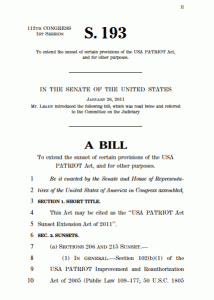
A screen shot of Sen. Patrick Leahy's, D-Vt., bill to extend three controversial provisions of the Patriot Act until December 2013.
The bill is sponsored by committee Chairman Patrick Leahy, D-Vt., and is one of several multiple-year extension proposals of the Patriot Act provisions up for debate. At the end of 2013, the provisions would “sunset” or expire.
Approved by a 10-7 vote, the legislation would extend Patriot Act authorities to use roving wiretaps on multiple electronic devices and to obtain court-approved access to business records deemed relevant to terrorist investigations.
It also would continue the authority to conduct secret surveillance of “lone wolf” terrorism suspects who are not Americans. These are alleged terrorists who don’t operate as part of al Qaeda or other terrorist groups.
The panel’s decision to sunset National Security Letters in December 2013 as well represents an attempt to appease civil liberties groups, who are frustrated by the lack of checks and balances on the provisions.
The letters have gained notoriety because they compel businesses to turn over customer records without probably cause or judicial oversight, and are often accompanied by gag orders.
Leahy said the bill strikes a balance between national security and civil liberties interests, but sunsets aren’t enough, said Michelle Richardson, legislative counsel at the American Civil Liberties Union.
“We are not asking that they sunset, we are asking that they be amended,” Richardson said. “We’ve been asking for the same thing for 10 years—that reasonable checks and balances be put into these tools so they can no longer be used to collect information on innocent people or people who aren’t suspected of doing anything wrong.”
Richardson said the increased congressional oversight in Leahy’s extension is not a permanent solution.
“For us oversight does not take the place of substantive amendments in the law,” she said.
Whether the provisions actually would be at risk of expiring depends on whether Congress would take any further action before the deadline. That’s the catch with sunset provisions. So far the government has acted every time, keeping much of the 2001 law intact and effectively creating a sense of permanency.
Congress first reauthorized the Patriot Act with a pair of bills passed in 2005 and 2006, reasoning it was still needed to effectively fight terrorism. When the three controversial provisions came up for renewal in 2010, President Barack Obama signed a one-year extension. And before they would have expired last month, lawmakers quickly tacked on another 90-day extension.
This series of short-term extensions has kept the Patriot Act alive and most likely such extensions will continue to be approved, said Paul Rosenzweig, former deputy assistant secretary for policy in the Department of Homeland Security.
“Some in the Republican side say let’s stop doing this,” Rosenzweig said. “Let’s just get it done and make it permanent. I think that that’s a question for the debate going forward.”
Sen. Dianne Feinstein, D-Calif., chairman of the Senate Intelligence Committee, has introduced legislation that would extend the three expiring provisions through 2013 with no opportunity for amendment. Her proposal does not include the oversight included in Leahy’s bill.
The third major proposal is co-sponsored by Sen. Chuck Grassley, R-Iowa, and Senate Minority Leader Mitch McConnell, R-Ky. It would permanently extend the provisions.
Meanwhile former CIA Director Michael Hayden has come out against any efforts to restrict Patriot Act provisions.
In a Washington Post opinion piece he co-authored with former Attorney General Michael Mukasey, they said, “The wall between intelligence-gathering and criminal investigation, thought before Sept. 11 to have been required by statute or the Constitution, but realized afterward to have been unnecessary, will be rebuilt.”
Leahy’s bill now goes before the entire Senate for a vote. Whatever the outcome, Rosenzweig said the Patriot Act is not dead yet.
“Reviving it in some form will happen, it’s really just a question of exactly what deal gets cut,” he said.





